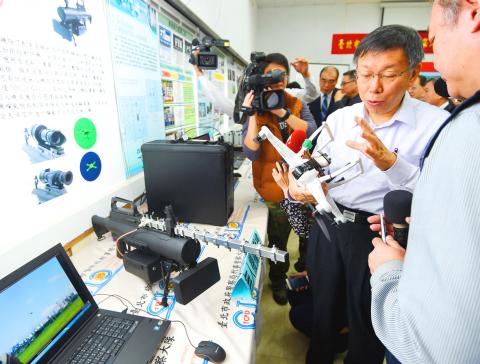The Taipei Police Department yesterday unveiled its High Technology Crime Investigation Unit to tackle criminal activities involving the use of advanced technology.
“In July this year, the Taipei Police Department cracked the First Bank automated teller machine theft, which had drawn international attention. The fraud ring committed crimes throughout the world and ended up being arrested in Taipei,” Taipei Mayor Ko Wen-je (柯文哲) said at the unit’s inauguration ceremony.
Statistics compiled by the police department showed that violent crimes have decreased over the years, while technological crimes have been on the rise, which is why Taipei Police Department Commissioner Chiu Feng-kuang (邱豐光) proposed creating the new unit as part of the Criminal Investigation Division, Ko said.

Photo: Fang Pin-chao, Taipei Times
The unit’s missions include equipping police officers with the skills to solve technological crimes, recruiting police officers with relavant work experience or academic background, as well as collaborating with academia to develop new technologies targeting cybercrime to ensure the police’s technological capacity is up to date with that of criminals, he said.
In addition to digital forensic tools and the global positioning system already in use when investigating technological crimes, the department would also tap big data to create a database recording criminal activities across the nation to forecast possible crimes, thereby outmaneuvering the criminals, the mayor said.
The unit, formerly known as the division’s “information office,” is not the first of its kind to be approved by the central government, but it has the largest staff and the most up-to-date forensic and investigative tools in the nation, the department said.
With the help of digital forensics, the division and the Taichung Investigation Bureau in September solved a nationwide malfunction of the YouBike public bicycle rental system after identifying the alleged suspect, it said.
A computer programmer surnamed Liao (廖), who works for a technology firm that designed the YouBike system, allegedly implanted malware that paralyzed rental stations in six cities and counties, reportedly as retaliation against his superior, who had scolded him shortly before the incident occurred.
Liao removed the malware after the alleged crime, but prosecutors and police said they located copies of it on his hard disk after sifting through 200,000 files.
Liao last week denied that he was involved in the case and was released on bail of NT$100,000.
He is to be questioned again by the Taichung District Prosecutors’ Office.
Additional reporting by CNA

Alain Robert, known as the "French Spider-Man," praised Alex Honnold as exceptionally well-prepared after the US climber completed a free solo ascent of Taipei 101 yesterday. Robert said Honnold's ascent of the 508m-tall skyscraper in just more than one-and-a-half hours without using safety ropes or equipment was a remarkable achievement. "This is my life," he said in an interview conducted in French, adding that he liked the feeling of being "on the edge of danger." The 63-year-old Frenchman climbed Taipei 101 using ropes in December 2004, taking about four hours to reach the top. On a one-to-10 scale of difficulty, Robert said Taipei 101

Nipah virus infection is to be officially listed as a category 5 notifiable infectious disease in Taiwan in March, while clinical treatment guidelines are being formulated, the Centers for Disease Control (CDC) said yesterday. With Nipah infections being reported in other countries and considering its relatively high fatality rate, the centers on Jan. 16 announced that it would be listed as a notifiable infectious disease to bolster the nation’s systematic early warning system and increase public awareness, the CDC said. Bangladesh reported four fatal cases last year in separate districts, with three linked to raw date palm sap consumption, CDC Epidemic Intelligence

US climber Alex Honnold left Taiwan this morning a day after completing a free-solo ascent of Taipei 101, a feat that drew cheers from onlookers and gained widespread international attention. Honnold yesterday scaled the 101-story skyscraper without a rope or safety harness. The climb — the highest urban free-solo ascent ever attempted — took just more than 90 minutes and was streamed live on Netflix. It was covered by major international news outlets including CNN, the New York Times, the Guardian and the Wall Street Journal. As Honnold prepared to leave Taiwan today, he attracted a crowd when he and his wife, Sanni,

Taiwanese and US defense groups are collaborating to introduce deployable, semi-autonomous manufacturing systems for drones and components in a boost to the nation’s supply chain resilience. Taiwan’s G-Tech Optroelectronics Corp subsidiary GTOC and the US’ Aerkomm Inc on Friday announced an agreement with fellow US-based Firestorm Lab to adopt the latter’s xCell, a technology featuring 3D printers fitted in 6.1m container units. The systems enable aerial platforms and parts to be produced in high volumes from dispersed nodes capable of rapid redeployment, to minimize the risk of enemy strikes and to meet field requirements, they said. Firestorm chief technology officer Ian Muceus said